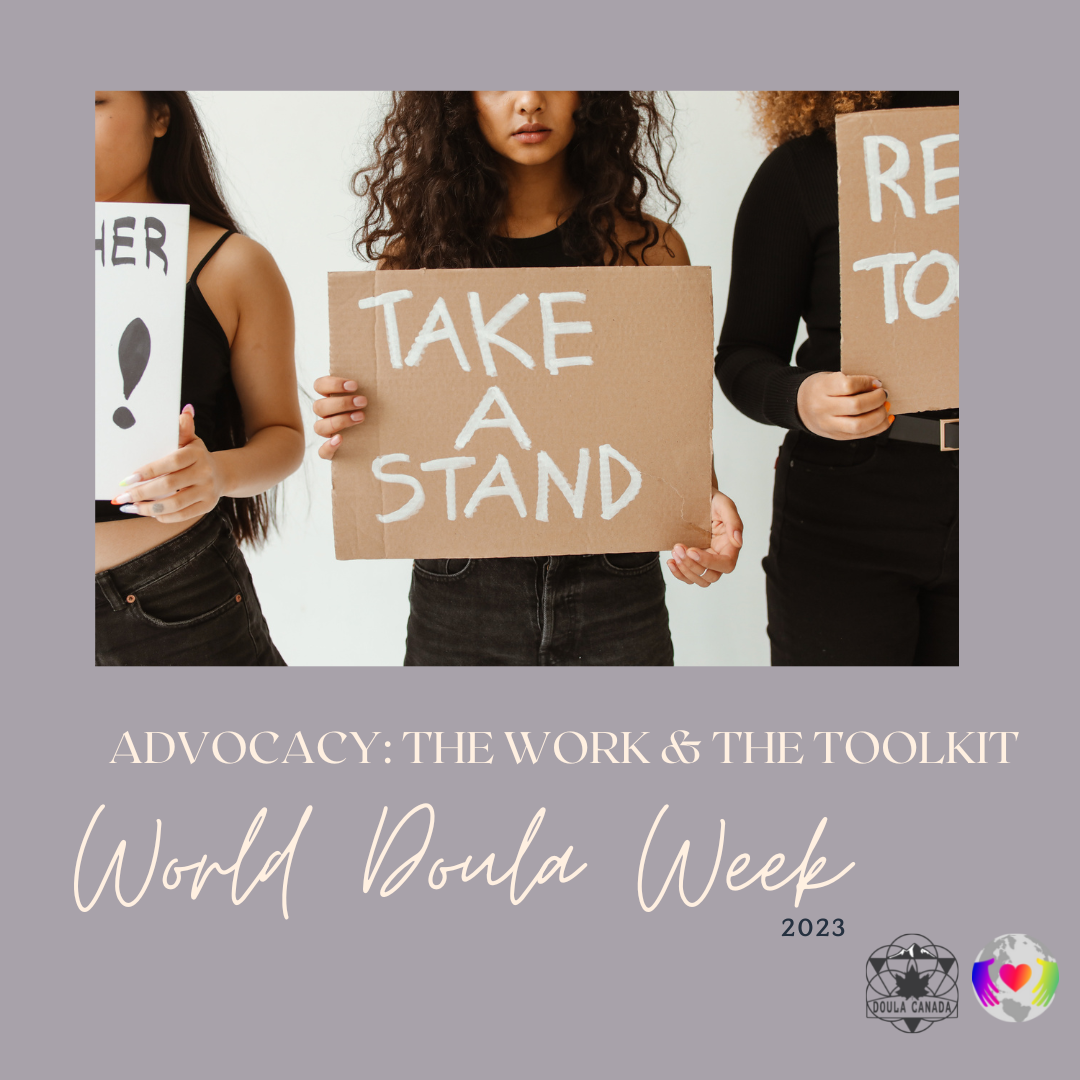[vc_row][vc_column][mk_padding_divider][/vc_column][/vc_row][vc_row][vc_column][vc_column_text css=”.vc_custom_1679688049452{margin-bottom: 0px !important;}”]
What is Advocacy?
“Advocacy” can describe any efforts or actions to change a policy, system, or institution that is in some way harmful to individuals or communities. It can also describe efforts to affect outcomes that are aligned with the needs or interests of particular individuals, groups, or society.
Current examples of advocacy include the efforts of Indigenous communities to expose the atrocities at residential schools and seek truth and reconciliation from the Canadian government.
In the context of perinatal healthcare, advocacy is usually focused on updating practices and policies that are not evidence-based, changing the scope, compensation, or other labour conditions of a health profession or occupation, or health equity and patient rights issues.
In the context of doula practice, advocacy can operate on three levels: self-advocacy, systemic advocacy, and individual advocacy (Gray & Jackson, 2002, Centre for Excellence in Disabilities).
Advocacy is not without controversy. The line between advocacy and activism is unclear and for many, this has a negative association with confrontation, aggression, and violence (Gray & Jackson, 2002).
For doulas, this controversy has some unique dimensions. One such dimension is that the field is growing, changing, and still seeking legitimization and security within the healthcare system. Another is that the philosophy of doula practice is largely focused on patient empowerment, making the role of systemic and individual advocacy unclear and subjective among doulas.
A 2020 paper by S.S. Yam based on interviews with doulas identified three types of tactics that doulas use to advocate for their clients during labour and delivery. She calls these “soft-advocacy” techniques because they differ from what we usually think of as advocacy. Staff and instructors at Doula Canada agreed they used these strategies and had lots of guidance to offer on exactly how to use them. Their guidance was used to develop the advocacy framework.
The three tactics identified by Yam are 1) creating deliberative space, 2) cultural and knowledge brokering, and 3) physical touch and spatial maneuvers.
Creating deliberative space refers to strategies that give the client more time to ask questions and make decisions. One example of how doulas do this is by noticing that care that deviates from their preferences is about to happen and bringing it to the client’s attention, prompting them to ask about the intervention that is about to happen.
Cultural and knowledge brokering refers to the tactics doulas use to make sure the client understands medical jargon or cultural norms. This could involve paying close attention to the information provided by the medical team, observing how well this is understood by the client, and repeating the information in language that the client uses and understands.
Physical touch and spatial maneuvering refer to the ways we use our bodies and physical contact with the client to advocate for their needs. Examples include using our bodies to conceal the client from view, modelling consent by asking permission each time we touch the client and using our presence to back up the client during interactions.
All of this is to say that doulas are indispensable in helping pregnant persons navigate the daunting, confusing, and sometimes violating process of giving birth. They are especially valuable for birthers who are already predisposed to face disadvantages in our medical system due to racism and sexism. Although doulas are poised to mend critical disparities in maternal health, they alone cannot fix inequities in the health system. Standing up for the rights of pregnant persons must go beyond the delivery room and extend into other spheres of advocacy related to disproportionate access to housing, lack of nutritious food, deficient public transportation systems, and inadequate sexual education. Advocacy needs to happen with all levels of policy makers, hospital administration and the general public.
Doula Canada has taken our Advocacy Framework and turned it into an accessible tool for birth workers to practice the skills of advocacy for themselves and their clients. It’s downloadable below.
[/vc_column_text][/vc_column][/vc_row][vc_row][vc_column][mk_padding_divider][/vc_column][/vc_row][vc_row][vc_column][vc_btn title=”Find the Advocacy Toolkit here ” color=”turquoise” link=”url:https%3A%2F%2Fstefanie-techops.wisdmlabs.net%2Fwp-content%2Fuploads%2F2023%2F03%2Fdtc-advocacy-toolkit-2023-1.pdf|target:_blank”][/vc_column][/vc_row]
